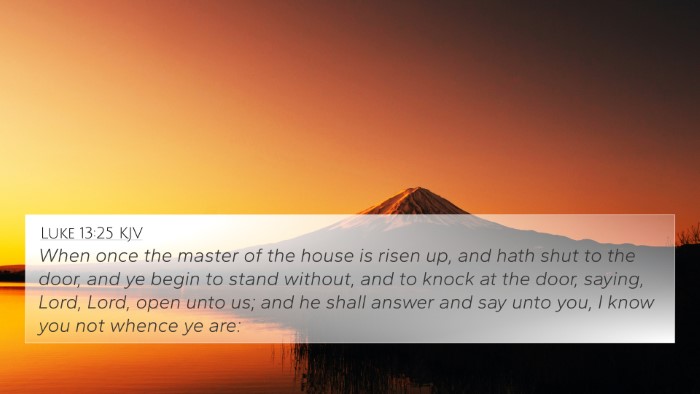Understanding Numbers 14:40
The verse Numbers 14:40 states: "And they rose up early in the morning, and gat them up into the top of the mountain, saying, Lo, we be here, and will go up unto the place which the Lord hath promised: for we have sinned." This verse encapsulates a significant moment in the narrative of the Israelites following their rebellion against God.
Contextual Analysis
In the context of the Book of Numbers, this verse illustrates the Israelites' response after receiving dire consequences for their disbelief. Earlier, they had refused to enter the Promised Land due to fear of the inhabitants, which led to God's punishment that they would wander in the wilderness for forty years.
Commentary Insights
- Matthew Henry: Henry notes that the Israelites' declaration of intent to ascend the mountain reflects a moment of regret and a desire for restoration. However, their actions are misguided since they are acting in rebellion against God's instructions, which illustrates the theme of human folly and the challenges of true repentance.
- Albert Barnes: Barnes emphasizes the contradiction in their statement; while they claim to seek to fulfill God's promise, their refusal to wait for divine guidance undermines their sincerity. He stresses that attempts to approach God's promises without obedient faith lead to spiritual danger.
- Adam Clarke: Clarke points out that their hasty decision to ascend back to the mountain reveals a persistent lack of faith in God's commandments. This verse serves as a warning against impulsive actions that arise from emotional regret rather than genuine repentance.
Thematic Connections
This verse not only stands alone but also connects deeply with various other biblical themes and narratives. Here are some thematic Bible verse connections:
- Exodus 16:3: The Israelites expressed doubt and discontentment with God's provision, reflecting their struggle with faith.
- Psalm 106:24-25: This passage summarizes Israel's rebellion in the wilderness, paralleling their actions in Numbers 14.
- Hebrews 3:19: This verse clarifies that doubts led to disobedience, linking the New Testament's reflections on the wilderness experience.
- Jeremiah 2:19: A call to reflection on past sins, resonating with the Israelites’ acknowledgment of their sin here.
- 1 Corinthians 10:5-6: A New Testament reminder that the history of Israel serves as a warning for believers today.
- Matthew 7:21: Jesus emphasizes that merely saying one believes is not sufficient; obedience is necessary.
- James 1:22: This passage highlights the importance of acting on one’s faith, warning against mere hearers of the word.
Cross-Referencing Biblical Texts
Numbers 14:40 serves as a poignant example of the importance of cross-referencing biblical texts to gain a deeper understanding of themes such as obedience, repentance, and faith. By examining the following connections, one can see the broader implications of this narrative:
- Deuteronomy 1:41-45: This further illustrates Israel's regret and self-reliance after God's decree.
- Hebrews 4:1-2: Discusses the promise of entering rest, tying back to the Israelites' initial lack of faith.
- Luke 13:3: Jesus teaches about the necessity of repentance in light of impending judgment.
Tools for Bible Cross-Referencing
To deepen your understanding of cross-references in Scripture, consider utilizing:
- Bible Concordance: A valuable tool for locating specific verses and their related references.
- Bible Cross-Reference Guide: Organized materials that help draw connections between various verses.
- Bible Study Methods: Engaging in thematic studies to explore connections between unrelated sections of Scripture.
- Bible Chain References: Systems that allow grouping of interconnected verses for enriched study.
Conclusion
Ultimately, Numbers 14:40 serves as a cautionary tale about the dangers of hasty decisions motivated by fear and regret. Through careful examination of this verse and its cross-references, readers can uncover profound truths about faith, obedience, and God's enduring promises. As you integrate this understanding into your study journey, reflect on how these themes are echoed throughout the Bible, fostering a deeper and more integrated understanding of God's Word.







